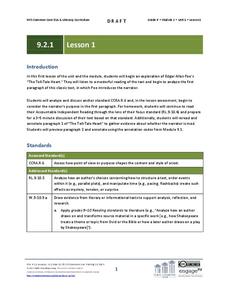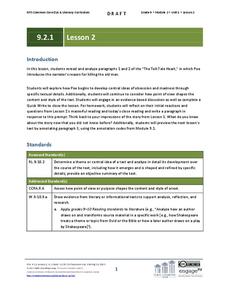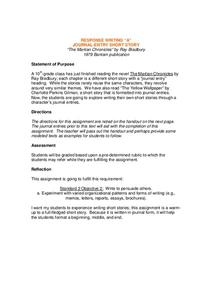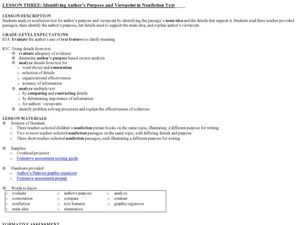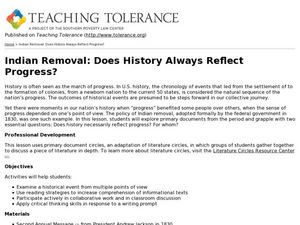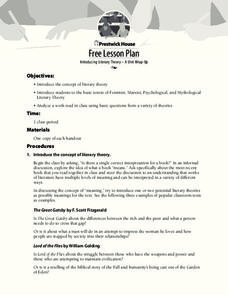EngageNY
Grade 9 ELA Module 2: Unit 1, Lesson 1
Once conceived, a guided set of literary analysis lessons will assist you day and night. Ninth graders look closely at "The Tell-Tale Heart" and analyze how Poe uses point of view to create questions about the narrator's sanity and...
EngageNY
Grade 9 ELA Module 2: Unit 1, Lesson 2
Make up your mind to complete a lesson plan about "The Tell-Tale Heart" and forever rid yourself of simple sentence structures. As ninth graders analyze the first two paragraphs of Edgar Allan Poe's short story, they consider how text...
EngageNY
Grade 9 ELA Module 2: Unit 1, Lesson 4
True, you may be very, very dreadfully nervous, but a literary analysis unit will set your mind at ease. Learners study the narrator's point of view in Edgar Allan Poe's "The Tell-Tale Heart" and analyze how it contributes to a...
PBS
The Power of Personal Narrative
Personal narratives are powerful things. Whether told from the first-person or third-person point of view, whether in the form of an essay, a short story, novel, or video, whether fiction or fact, they capture readers and give them...
Simon & Schuster
Curriculum Guide to: Wuthering Heights by Emily Brontë
Eight lessons and worksheets comprise a curriculum guide for Emily Bronte's Wuthering Heights. Class members create a timeline that includes world-historical events as well as events in the novel. They analyze the speaking styles of...
Simon & Schuster
Curriculum Guide to: Pride and Prejudice by Jane Austen
An 18-page curriculum guide for Jane Austen's Pride and Prejudice consists of five lessons. The first plan asks readers to compare the manners, social behaviors, and class issues in Austen's novel to today's. Next, pupils examine a...
Simon & Schuster
Curriculum Guide to: A Tale of Two Cities by Charles Dickens
A Tale of Two Cities is the core text for five lessons in a Curriculum Guide for Charles Dickens' famous novel. To begin, scholars examine Dickens' use of anaphora in the first line of the novel. Next, they compare the point of view in a...
K20 LEARN
You Think You Have Problems: Perspective in Multi-Genre Literature
Young scholars are asked to reflect on how personal experiences might influence points of view and perspectives. They read poems and biographies of the poets and then match the poem to the poet. To justify their matches, learners...
Curated OER
Reliving History through Slave Narratives
Helpful for an American literature or history unit, this lesson prompts middle schoolers to examine slavery in the United States. They read slave narratives that were part of the Federal Writers' Project and then conduct their own...
Curated OER
Historical Agency in History Book Sets (HBS)
Study historical events by combining the study of historical fiction and non-fiction. Learners read about true past events in historical fiction novels and then research non-fiction accounts of the same events. What are some differences...
Novelinks
The Martian Chronicles: Response Writing
Follow the format of Ray Bradbury's The Martian Chronicles with a journal-writing activity. Readers choose a character and examine the character's life and circumstances through brainstorming, research, and discussion before writing a...
Curated OER
Things Aren't Always What They Seem
Young scholars use video and the Internet to make predictions, draw conclusions, determine conflict and point of view while reading a short story. In this short story analysis lesson, students watch a related video and complete a...
Curated OER
Hawthorne: Author and Narrator
High schoolers read various pieces of literature by Nathaniel Hawthorne to recognize the difference between a narrator and author. Students in small groups report on the narrative point of view represented in a story they have read.
Novelinks
Sense and Sensibility: Concept Analysis
If you need an anchor for your unit on Sense and Sensibility, use a concept analysis with key discussion points. It includes literary themes, vocabulary, background information, and suggestions for addressing gender and diversity questions.
Allen & Unwin Book Publishers
In the Skin of a Monster
Kathryn Barker's In the Skin of A Monster explores how a school massacre impacts a community. Unfortunately, the events depicted are all too familiar to many. This teacher's guide for Barker's novel offers activities that enable readers...
Curated OER
Characteristics of Point of View and Dialogue
Students discover the impact of dialogue Shakespeare's Julius Caesar. In this drama lesson, students read selected scenes and note the point of view and dialogue in the scenes.
Curated OER
Macbeth and Lady Macbeth's Tortured Sonnet
Students read four of Shakespeare's sonnets and determine whether they are read from Macbeth's or Lady Macbeth's point of view. They support their decision using evidence from the text.
Curated OER
Identifying Author’s Purpose and Viewpoint in Nonfiction Text
Why do people write books? Pupils discover how to identify the author's viewpoint. They read non-fiction passages their instructor selects (the plan has the class look at nonfiction children's picture books), and then identify the...
Curated OER
After: A Study of Individual Rights
Use the dystopian novel After by Francine Prose to spark discussion about individual and student rights. Learners read the novel, evaluating how far a school can go to control its attendees. As they read, scholars fill out a chart...
Academy of American Poets
Teaching the Vietnam War with Poetry and Archives
The language of and the perspective of photographs, poems, and official reports differ. After a close reading of two photographs, two poems, and a military report about the Vietnam War, individuals adopt someone's voice or something from...
Curated OER
Indian Removal: Does History Always Reflect progress?
Young scholars explore the idea that progress for some might not mean progress for all. In this Native American lesson, students recognize different viewpoints about historical events through the study of primary documents. Young...
National Endowment for the Humanities
"Old Southwest" Humorists and George Washington Harris
Young scholars discover the work of George Washington Harris and his influence on American humor. For this George Washington Harris lesson, discuss cultural differences in the United States and read Sut Lovongwood stories by George...
Prestwick House
Introducing Literary Theory – A Unit Wrap-Up
Literary theories are lenses through which a text may be analyzed. The question in this lesson plan is how a particular literary lens can influence the reader's view of the text.
K20 LEARN
The Power of Poetry: Perspectives in Poetry
What do Abraham Lincoln, Dr. Martin Luther King, Jr., and Amanda Gordon have in common? They all believe in the power of words—the power of words to create change. After analyzing the rhetorical strategies in several poems and speeches,...
Other popular searches
- Authors Point of View
- Teaching Point of View
- Author's Point of View
- Point of View Rubric
- Identifying Point of View
- Point of View Narrator
- First Person Point of View
- Animal Point of View
- Different Point of View
- Third Person Point of View
- Ants Point of View
- Message Point of View


